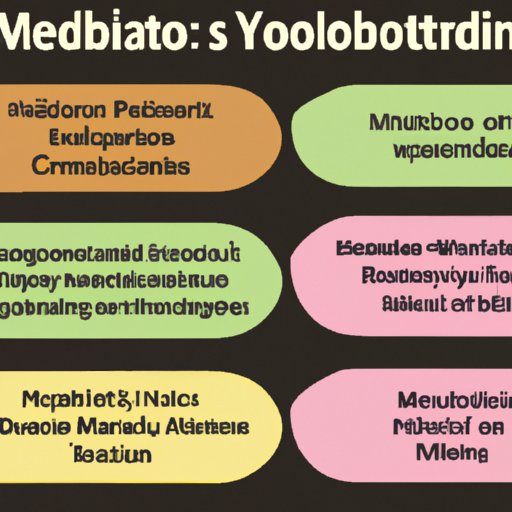
Introduction
Metabolism is the process by which your body converts food into energy. It’s a vital aspect of overall health that affects everything from weight control to mental clarity. In this article, we’ll explore five different topics that can help you boost your metabolism and achieve your health goals.
Simple Lifestyle Changes to Boost Your Metabolism
There are several simple changes you can make to your daily routine to increase your metabolism. These include:
- Staying hydrated
- Eating protein-rich foods
- Doing high-intensity interval training
- Getting good sleep
- Managing stress
Incorporating these changes into your lifestyle can be easy with a few simple tips. For example, make sure to carry a reusable water bottle with you so you can stay hydrated throughout the day. Swap out carb-heavy breakfasts for protein-rich options like eggs or Greek yogurt. Try incorporating short, high-intensity workouts into your routine as a quick way to boost your metabolism. Prioritizing good sleep hygiene and finding stress-management techniques that work for you can also do wonders for your overall health and wellness.
Fire Up Your Metabolism with These Nutrient-Dense Foods
In addition to making lifestyle changes, you can also incorporate specific foods into your meals and snacks to help boost your metabolism. Some of the most effective options include:
- Avocado, which is loaded with healthy fats that can rev up your metabolism
- Spicy foods like chili peppers, which contain capsaicin, a compound that can raise your body’s core temperature and stimulate metabolism
- Coffee, which contains caffeine that can give you a boost of energy and increase your metabolism
- Green tea, which has been shown to increase metabolic rate and aid in weight loss
- Leafy greens like kale and spinach, which are packed with vitamins and nutrients that can support a healthy metabolism
Adding these foods to your meals can be simple and delicious! Try adding avocado to your morning toast or smoothie, incorporating spicy chili peppers into your stir-fries or soups, sipping on a cup of coffee or green tea in the morning, and adding leafy greens to your salads or as a side dish with your meals.
Crank Up Your Metabolism with These Quick Workouts
In addition to making dietary changes, incorporating quick workouts into your routine can also boost your metabolism. Some effective options include:
- HIIT (High-Intensity Interval Training), which involves short bursts of intense activity followed by brief periods of rest
- Jumping jacks and squats or lunges to get your heart pumping and boost your metabolism
- Circuit training with weights or resistance bands
- Core exercises like planks and crunches, which can help build muscle and increase metabolism
- Dance or Zumba-style workouts that combine cardio and strength training
It’s important to make sure any workout you do is safe and effective for your fitness level and goals. There are typically variations and modifications available for each exercise, so don’t be afraid to switch things up or modify as needed. Quick workouts can be easily incorporated into your routine – try doing a 10 minute HIIT workout in the morning or taking a short walk during your lunch break.
The Science of Metabolism: Understanding How it Works and What Affects it
To truly understand how to boost your metabolism, it’s important to understand what metabolism is and how it works. Metabolism is the process by which your body converts food into energy, and there are several different types of metabolism. Your basal metabolic rate (BMR) is the amount of energy your body uses just to keep you alive – this includes basic functions like breathing and pumping blood. Other types of metabolism include the thermic effect of food (how many calories you burn digesting and processing food) and exercise metabolism (how many calories you burn during exercise).
There are a myriad of factors that can affect your metabolism, including age, gender, genetics, and lifestyle habits. For example, as you age, your metabolism naturally slows down – this means you may need to adjust your lifestyle habits to maintain a healthy weight. Women tend to have a slower metabolism than men, and genetics can also play a role in metabolic rate. Lifestyle habits like diet and exercise can also have a significant impact on metabolism.
Metabolism Myths: Separating Fact from Fiction
There are several common myths surrounding metabolism that can lead to misconceptions and ineffective approaches to boosting your metabolism. Here are a few popular myths debunked:
- Myth: Eating spicy foods will significantly boost metabolism
Fact: While spicy foods can offer a slight boost to metabolism, the effect is relatively small and short-lived - Myth: Eating smaller, more frequent meals will boost metabolism and aid in weight loss
Fact: The impact of meal frequency on metabolism is relatively small, and meal timing may be more important than frequency - Myth: Certain foods, like grapefruit or celery, have the power to burn fat and boost metabolism
Fact: While these foods have some health benefits, there is no scientific evidence to suggest they significantly impact metabolism or weight loss
Instead of relying on these myths, there are many evidence-based approaches to boosting your metabolism. Incorporating nutrient-dense foods, staying hydrated, and exercising regularly are all powerful ways to support a healthy metabolism and overall wellness.
Conclusion
Overall, there are several different approaches you can take to boost your metabolism and promote overall health and wellness. Simple lifestyle changes like staying hydrated and managing stress, incorporating nutrient-dense foods into your meals, and incorporating quick workouts into your routine can all contribute to a healthy metabolism. It’s also important to understand the science behind metabolism and to separate fact from fiction when it comes to myths and misconceptions.




